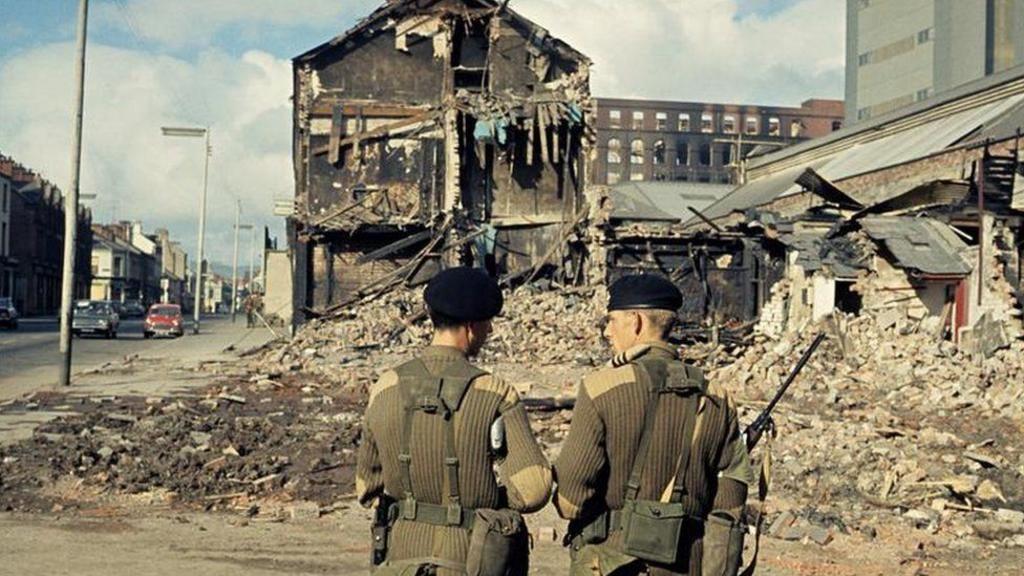The Northern Ireland Secretary has asserted that the government’s new Troubles legacy legislation poses no direct threat to national security.
Hilary Benn addressed questions from Members of Parliament during a debate lasting over three hours, as the bill underwent its second reading in the House of Commons.
The bill, which successfully passed this stage with 320 votes in favor and 105 against, outlines plans for a commission to investigate Troubles-related killings and a separate body for information recovery.
These measures were established through a joint framework with the Irish government.
Last week, nine senior former military officers voiced concerns about the bill, cautioning that “lawfare” had become “a direct threat to national security.”
During Tuesday’s debate, Benn addressed the open letter published in The Times newspaper, stating to MPs, “I don’t agree with that assessment.”
The Secretary of State affirmed that “there is nothing in this bill that can be described as a direct threat to national security.”
He also noted that the generals who signed the letter “do not call for immunity,” a provision that sparked controversy in the previous Conservative government’s legislation.
Benn’s remarks came in response to Conservative MP Mark Francois, who raised concerns about the letter.
Francois questioned whether the proposed legislation “is as good as the Secretary of State would have the House believe,” considering the concerns expressed in the correspondence.
Labour’s bill aims to replace the contentious Legacy Act, which imposed a ban on inquests and civil actions related to incidents from the Troubles era.
The new plan encompasses a Legacy Commission to investigate Troubles-related killings, a separate information recovery body, and a dedicated legacy unit within An Garda Síochána (Irish police).
These measures were agreed upon through a joint framework with the Irish government.
The UK government is also proposing a separate package of protections for veterans.
However, some MPs, including those from Northern Ireland, have stated that the measures do not go far enough and are seeking amendments to the bill to include stronger legal protections.
Speaking in the Commons, Benn stated that “time is running out” to resolve the “unfinished business” of the Troubles.
He refuted suggestions that the Irish government had been granted “any control or veto” over the work of the Legacy Commission.
The Northern Ireland Secretary also confirmed that a “Victims and Survivors Advisory Group” to be established for the commission will exclude former paramilitaries.
Traditional Unionist Voice (TUV) leader Jim Allister requested Benn to identify the specific clause in the bill that outlines this exclusion.
The Secretary of State responded, “Anyone who was previously involved in paramilitary activity will not be appointed to the victims and survivors group.”
“I am giving the House that assurance as the Secretary of State.”
Conservative MP Alex Burghart, the shadow secretary of state for Northern Ireland, stated that Labour’s bill “reopens the door to vexatious litigation against veterans.”
“The legislation before us today will perpetuate disappointment for victims and despair for veterans,” he added.
During the debate, Democratic Unionist Party (DUP) leader Gavin Robinson questioned the level of detail in the bill.
“Those innocent victims of Northern Ireland have heard this government promise to ‘repeal and replace’, and yet that’s not what they’re seeing,” he stated.
The MP argued that there was “no specific protection for veterans” in the bill, describing the assurance as a “mirage.”
He added, “Shame runs throughout the legacy of our past and governments’ approach to it.”
Social Democratic and Labour Party (SDLP) leader Claire Hanna commented that “while legacy remains unresolved, it is like a fog around us.”
“This bill isn’t perfect, legislation rarely is, but we can’t miss the opportunity to deal with legacy,” she added.
“It is not about an obsession with the past. Getting this right is about an obsession with a non-violent and reconciled future.”
Earlier, the Ulster Unionist Party’s (UUP) MP for North Antrim, Robin Swann, announced that he would be voting against the bill in its current form.
“We will seek to introduce and support further amendments to ensure this bill is properly scrutinised and improved,” he stated.
“Innocent victims must remain at the centre of any legacy legislation – its purpose must be to serve and protect those innocent victims.”
The government has stated that the deal includes a package of protections for veterans, including “a protection in old age.”
The Legacy Commission, stemming from the Independent Commission for Reconciliation and Information Recovery (ICRIR), will have independent oversight.
The new commission will also be “under a statutory duty not to duplicate the work of any previous investigations unless there are compelling reasons to do so.”
It will appoint two new directors for investigations.
The commission must also “take into account the health and well-being of potential witnesses at all times.”
Inquests that had commenced but not concluded before the current Legacy Act came into force last year will be reinstated.
Other inquests that had not yet begun will be reviewed to determine a path forward.
Meanwhile, the Home Office has confirmed that 77 Troubles-related killings in England remain unsolved.
Dan Jarvis, UK Security Minister, and a former member of the Parachute Regiment who served in Northern Ireland, stated that the proposed new legacy legislation “guarantees no terrorist will be able to claim immunity from prosecution.”
He continued that this is “while ensuring there is an effective and wholly independent Legacy Commission to conduct investigations that families right across the United Kingdom can have confidence in.”
Tánaiste (Ireland’s PM) Simon Harris is hosting NI Secretary Hilary Benn in Dublin at the British-Irish Intergovernmental Conference.
A look at the people who were the Disappeared from Northern Ireland’s Troubles.
Brendan Murphy, a photographer who captured memorable moments of the Troubles, has died aged 84.
The disclosure of material about the 1998 Omagh bombing remains an on-going process.
Captain Nairac was killed and secretly buried by the IRA almost 50 years ago.

